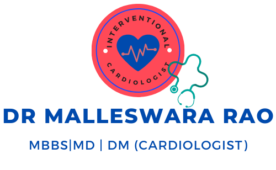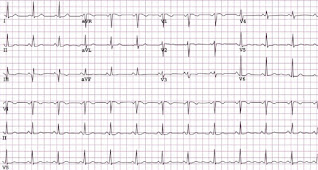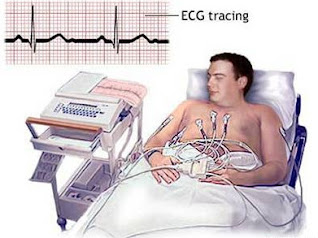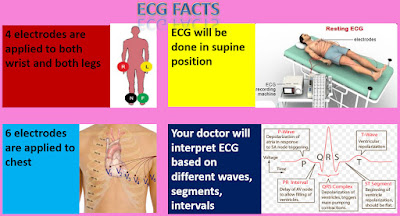What is an electrocardiogram (ECG)?
An electrocardiogram or ECG test is a simple test that will assess your heart’s rate, rhythm and electrical activity.
Why would I have ECG test?
An ECG test is one of the most common basic heart tests. In fact, it is the only way of uncovering certain problems with the heart’s electrical impulses.
You should have ECG test if you have
1. Chest pain
2. Giddiness or syncope
3. Swelling of feet
4. Palpitations ( feeling your own heart beat)
5. Shortness of breath when you exert (Dyspnoea, feeling short of breath)
6. Irregular heartbeat
8. Diabetes
9. Family history of heart attack
10. Suspected heart valve problem.
11. Suspected blockage in arteries supplying the heart
12. Suspected hole in your heart
13. Suspected mixing of bad blood with good blood in and around your heart
14. To rule out heart attack
15. To study effect of certain minerals on your heart (potassium, calcium)
16. To study effects of certain drugs on your heart (digoxin, QT prolonging drugs)
17. Before starting exercise programme
It can also be a useful way of ruling out other heart problems. If your doctor recommends an ECG test, think of it as a basic investigation.
What does the ECG test involve?
The ECG test is a simple test that takes hardly 2-3 minutes. Technician will put 10 electrodes to record 12 different views of your heart’s electrical activity. You don’t need to do anything to prepare for it. You have to lies flat. You may be asked to remove or slide up your
shirt or blouse. Technician will apply colorless jelly at ankle, wrist, and chest. An electrode is attached to each ankle and wrist with sticky pads and six more are attached to your chest. Relaxing for a few minutes before the recording is made is important, as this allows the electrode connections to stabilize and means the ECG will be more reliable. During this time, your details can be recorded on the ECG machine.
shirt or blouse. Technician will apply colorless jelly at ankle, wrist, and chest. An electrode is attached to each ankle and wrist with sticky pads and six more are attached to your chest. Relaxing for a few minutes before the recording is made is important, as this allows the electrode connections to stabilize and means the ECG will be more reliable. During this time, your details can be recorded on the ECG machine.
Will ECG test hurt?
No, ECG test is a painless test.
Are there any after effects with ECG test?
Normally there are no after effects with ECG test. Jelly applied to you may stick to your clothes that can make things messy.
What will ECG test tell my doctor?
A normal ECG is reassuring to the patient but it will not completely rule out heart problem. One can have serious heart problem with normal ECG also. An abnormal ECG can tell your doctor the actual problem you have. However, an abnormal ECG can be possible
with completely normal heart. So, ECG should be read with background of patient data.
with completely normal heart. So, ECG should be read with background of patient data.
Certain heart problems can be identified by ECG by your doctor such as:
- Arrhythmia (abnormally slow or fast heartbeat. E.g. Supraventricular tachycardia ,ventricular tachycardia, atrial fibrillation, atrial flutter, sinus bradycardia)
- Problems with the origin or spread of electrical activity within the heart that dictate your heart rate (sinus bradycardia,
atrioventricular blocks) - An enlarged heart chambers (enlarged left ventricle, enlarged right ventricle, enlarged right atrium, enlarged left atrium)
- Thickened heart (left ventricular hypertrophy{LVH})
- Areas of the heart with reduced blood supply due to blockage in arteries supplying your
heart (coronary artery disease) - A ‘silent’ heart attack (an interruption to blood flow in the coronary arteries without usual heart attack symptoms).
- Present or old heart attack (myocardial infarction {MI})
- Risk of sudden death
Your ECG can help your doctor treat you in a right way.
Will I need more tests afterwards based on ECG test?
Depending on the ECG results and the symptoms being experienced, you may be asked to undergo other tests. For example, if your ECG at rest is normal, but you experience chest pain when walking upstairs or uphill, you may be advised to undergo treadmill test If you are experiencing palpitations (a noticeably rapid, strong or irregular heartbeat) or syncope, you may require Holter monitoring (longer ECG recording for 24 to 48 hours) even if ECG is normal. If you are experiencing swelling of feet or breathlessness, you may require 2d echo test.
CT angiogram or a coronary angiogram may be required to see for certain whether anything is obstructing blood flow to the hearts depending on your symptoms.
Where can I undergo ECG test in Hyderabad?
ECG test will be done at DM HEART CARE CLINIC,Attapur, Hyderabad. We have latest 12 channel ECG machine.






